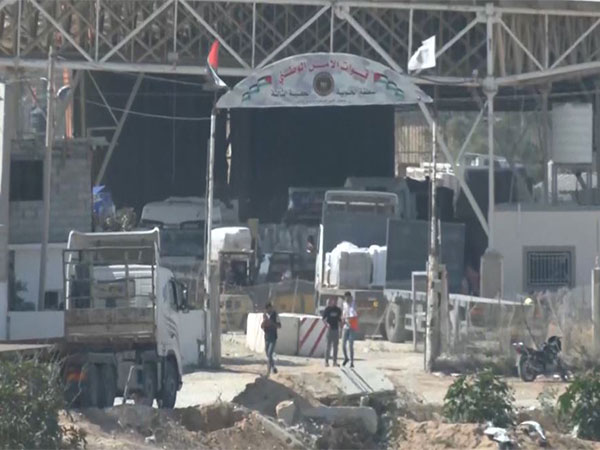Aid trucks enter Egypt's Rafah border crossing with Gaza Strip
"I am confident that this delivery will be the start of a sustainable effort to provide essential supplies – including food, water, medicine and fuel," he said. Israel imposed a total blockade and launched air strikes on Gaza in response to a deadly attack on Israeli soil by Hamas on Oct. 7.

The first humanitarian aid convoy to be sent to the besieged Gaza Strip since war broke out there began moving through the Rafah border crossing from Egypt on Saturday after days of diplomatic wrangling over conditions for delivering the relief. The United Nations said the 20-truck convoy included life-saving supplies that would be received by the Palestinian Red Crescent. Palestinian group Hamas, which controls the Gaza Strip, said the delivery included medicine and limited amounts of food.
Rafah is the main route in and out of the Gaza Strip that is not controlled by Israel, and the focus of efforts to deliver aid to Gaza's 2.3 million residents. U.N. officials say at least 100 trucks a day are needed in Gaza to cover urgent needs, and that any delivery of aid needs to be sustained and at scale. Before the outbreak of conflict, an average of about 450 aid trucks were arriving there daily.
"The humanitarian situation in Gaza – already precarious – has reached catastrophic levels," U.N. humanitarian chief Martin Griffiths said in a statement. "I am confident that this delivery will be the start of a sustainable effort to provide essential supplies – including food, water, medicine and fuel," he said.
Israel imposed a total blockade and launched air strikes on Gaza in response to a deadly attack on Israeli soil by Hamas on Oct. 7. The Rafah crossing has been out of operation since shortly afterwards, and bombardments on the Gaza side damaged roads and buildings that needed repairs. SUPPLIES RUNNING OUT
The U.N. has warned that food has been running out in Gaza and supplies of fuel needed to keep hospital back-up generators running have reached dangerously low levels. Israel has said it will allow no aid to enter from its territory until Hamas releases the hostages it took during its attack, and that aid can enter through Egypt as long as it does not end up in the hands of Hamas.
Western states have been pushing to evacuate foreign passport holders from Gaza and the U.S. Embassy in Israel said any border opening on Saturday could enable foreigners to leave the territory. U.N. Secretary-General Antonio Guterres visited the border on Friday in a push to get the aid in, saying a mechanism for inspection of the aid demanded by Israel was still being worked out and that delivery of relief should not be tied to the release of hostages or evacuation of foreigners.
Many of Gaza's residents have crammed into the south of the territory to avoid air strikes in the north. "We have upped the logistical and operational abilities of the Red Crescent by adding more volunteers and cars," said Mahmoud Abu Atta, of the Palestinian Red Crescent, as he entered the Palestinian side of the Rafah Crossing to receive aid.
"We have rented storages in Khan Younis and Rafah. There are food materials and medical materials," he said.
(This story has not been edited by Devdiscourse staff and is auto-generated from a syndicated feed.)
ALSO READ
Gaza war: UN World Food Programme condemns Israeli attack on aid convoy
International Push to Free Israeli-Russian Researcher Kidnapped in Iraq
U.S. Congress Moves to Counter ICC's Actions Against Israeli Leaders
Escalating Tensions: Israeli Strike Hits Jenin
Tensions Rise as Israeli Far-Right Minister Threatens to Quit Over Gaza Ceasefire Deal










